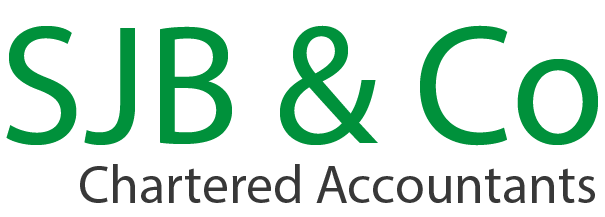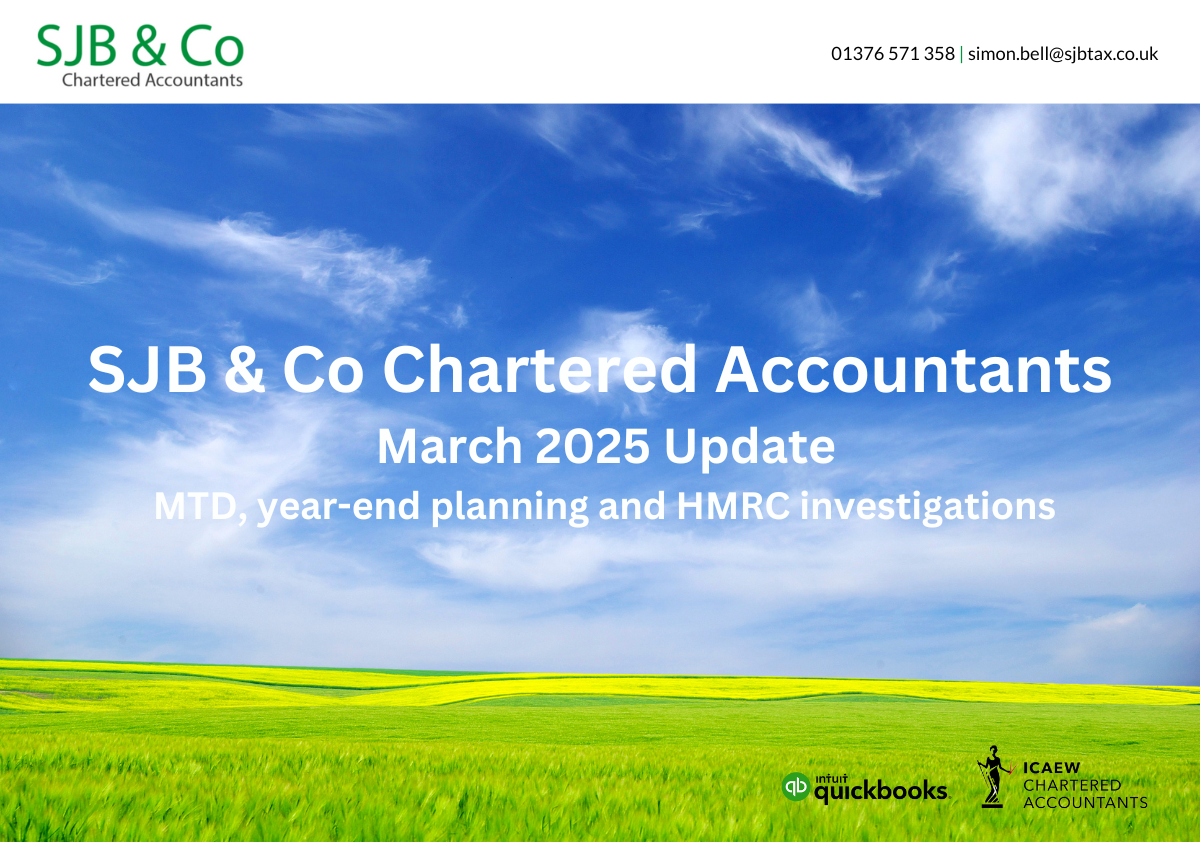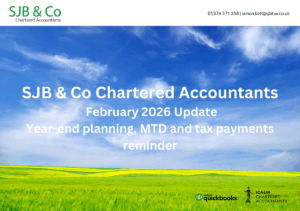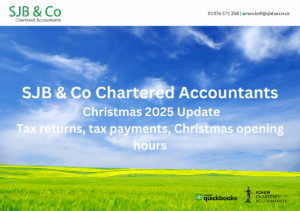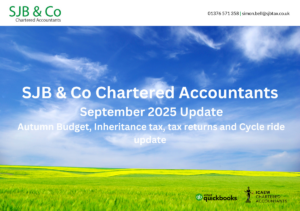Hello everyone,
Hello everyone, this month we are covering Making Tax Digital, year-end planning and a note on HMRC compliance activity. As always, if there are any questions please let me know.
Kind regards
Simon
Spring statement
The Spring statement is due on Wednesday the 26th of March, so we will be circulating a note on points of interest shortly afterwards.
Making Tax Digital (MTD)
MTD is now due to commence next year for individuals (not for partnerships or companies where the start dates have yet to be announced) depending on your gross income (turnover) from self-employment and / or property income as follows:
- From 6 April 2026, MTD will apply to all self-employed and property landlords whose gross income is over £50,000 in 2024/5.
- From 6 April 2027 the income threshold reduces to £30,000.
- At some point before the next election the income threshold will reduce to £20,000.
What does MTD involve?
- There will be a requirement to maintain records digitally, this means that some form of accounting software will need to be used which is capable of keeping records in an appropriate format and submitting reports to HMRC.
- Quarterly reports will have to be submitted within a month of the quarter end and an end of year return so 5 additional reports per year.
We will be discussing MTD with affected clients over the coming months and contacting those expected to be within the rules for 2026/27 to start using accounting software.
HMRC will be sending out letters in April to people who exceed or are about to exceed the £50,000 income limit. If you receive such a letter from HMRC do not ignore it (but equally do not panic!), get in touch with us to discuss the action required to be ready for MTD in 2026.
The points to be aware of are:
- If you are not already doing so, software will need to be used for record keeping going forward. We can advise on choice of software and can deal with as much of the day-to-day record keeping as you wish.
- So that you are ready for quarterly reporting in 2026, it is our intention that software will be used for the current year to 5 April 2026 starting from next month for those who will be required to adopt MTD in 2026. It will also be necessary to have separate bank accounts for self-employment and rental businesses. So if are self-employed and have rental income you should have two bank accounts, one for rental income and one for self-employment income with no personal activity on the accounts.
- As quarterly reporting is required, it will be necessary to keep records up to date regularly, at least monthly preferably on a weekly basis depending on the number of transactions rather than a once-a-year activity.
- In the year that you start MTD you will potentially have significantly more accounts work to do as there will be the previous year’s accounts to complete and quarterly reporting e.g. in 2026/27, there will be accounts for the year to 5 April 2026 to complete and return to submit as well as quarterly reporting starting with the quarter to 5 July 2026. The additional work will have time and cost implications to consider.
Year-end planning tips
With the end of the tax year approaching, there are number of reliefs and allowances that individuals may wish to consider reducing their tax bills some of which if not used by the end of the year will be lost:
- Make pension contributions – with increased allowances this year now is a good time to make or increase pension contributions.
- Use your ISA allowance – up to £20,000 can be paid in and once in income and gains are tax free.
- Make capital disposals – to use your annual exemption, although this is only £3,000 now.
- Dividend allowance – this year it is only £500 – owners of private companies should ensure that they pay a dividend at least equal to the dividend allowance if they have sufficient profit.
- VCT and EIS investments – for the more adventurous investor, you may want to consider these tax efficient investments that provide income tax relief of 30% on investment and other tax advantages. Individuals considering these investments should take advice from a suitably qualified financial adviser. We can only comment on the tax implications.
- Make gifts of up to £3,000 to utilise inheritance tax annual exemption. For a couple gifts of up to £6,000 will exempt without needing to live for 7 years. The £3,000 annual gift allowance can be carried forward one year if not used in the previous year, which means a total of £12,000 for a couple can be gifted.
- Make gifts of up to £250. Gifts of up to £250 per annum can be made to as many different people as you wish and be exempt from IHT, though the recipients cannot also receive gifts using the £3,000 annual exemption. For example gifts of £250 could be made to say 20 grandchildren and a total of £5,000 could be exempt from IHT.
HMRC compliance activity
HMRC are increasing investigation activity and are recruiting additional staff for this. HMRC has access to large amounts of data and are increasingly using this to start enquiries. For example they can pick up house sales from the Land Registry and cross-check whether this was your main residence or has been reported on a capital gains return and if not raise enquiries.
“Nudge” letters are letters sent to groups of taxpayers who HMRC believe from data they hold may not have reported all their income. If you receive a “nudge” letter it is important that you take advice and act promptly. If you have tax to pay co-operation and a prompt response will help minimise any penalties and if you do not have anything to report make sure to respond as requested to avoid HMRC opening a formal investigation.
Areas that are currently being targeted by HMRC include:
- Cryptocurrency – if you hold cryptocurrency have you reported all transactions?
- Undeclared dividends of private companies – do not overlook reporting of dividends- see our article: Here .
- Capital gains – with the annual exemption now £3,000 it is important that you keep track of and report capital gains.
- Rental income – HMRC continues to target non-reporting of rental income. There is an established process for reporting undeclared rental income using the Let Property Scheme – if anyone has any concerns in this area please get in touch.
- Selling via ebay and other online markets – online platforms are required to provide HMRC with details of individuals making sales over a threshold amount of around £1,700. The selling of unwanted personal and household goods should not be an issue, however the buying and selling of goods to make a profit is another matter and if gross income exceeds the trading allowance of £1,000 then it should be reported to HMRC on a tax return. HMRC have a helpful article explaining situations which may be taxable and which are not: Here
- Overseas assets, income and gains – HMRC receive reports from an increasing number of overseas countries under bilateral agreements concerning income and gains on overseas assets. Do not think you can overlook reporting of foreign income and gains and it will not be picked up. HMRC are receiving increasing amounts of data from abroad and it is only a matter of time before they start to use this more effectively.
For more information or to discuss any issues raised above please contact Simon Bell by phone on 01376 571358 or email [email protected] .
Please feel free to forward this newsletter to any colleagues or friends who may be interested in it.
This newsletter is written in general terms and therefore cannot be relied on to cover specific situations; applications of the principles set out will depend on the particular circumstances involved and it is recommended that you take professional advice before acting or refraining from acting on any material in the newsletter.
